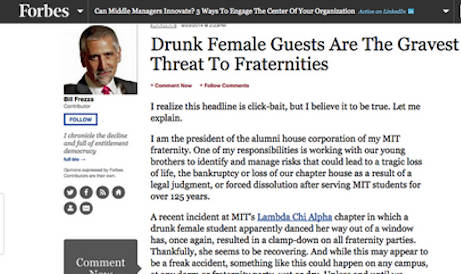Eye | UAE Pilot Major Mariam al-Mansouri Leads UAE Air Strikes Against ISIS | Domestic Violence Tab Put At $9.5 Trillion Annually
/
RedTracker
 Forbes axed a column and future columns from contributor Bill Frezza, an MIT graduate and alumni president of MIT’s Lambda Chi Alpha chapter, after Frezza’s column Drunk Female Guests Are The Gravest Threat To Fraternities hit the digital airwaves. Forbes quickly pulled the column but not before Gawker Media jumped on it. Jezebel has reprinted the column for posterity.
Forbes axed a column and future columns from contributor Bill Frezza, an MIT graduate and alumni president of MIT’s Lambda Chi Alpha chapter, after Frezza’s column Drunk Female Guests Are The Gravest Threat To Fraternities hit the digital airwaves. Forbes quickly pulled the column but not before Gawker Media jumped on it. Jezebel has reprinted the column for posterity.
Frezza, who writes that he chronicles “the decline and fall of entitlement democracy” argued on Forbes last month:
As recriminations against fraternities mount and panicked college administrators search for an easy out, one factor doesn’t seem to be getting sufficient analysis: drunk female guests.
Clearly the threat of drunk coeds is front and center in Frezza’s mind. Last month, his Ban Kegs From Fraternity Parties? Require Them Instead column described the scope of the problem:
I have the privilege of serving as the president of the alumni corporation for my MIT fraternity. This puts me in the role of loco parentis to 40 college boys, a responsibility I take seriously. While MIT undergrads may not be entirely representative of the country’s college students, even the smartest kids are still capable of doing stupid things. And if you think teenage boys can be stupid when it comes to alcohol, the girls seem to work overtime to do them one better. I have witnessed 95-pound, 18-year-old coeds standing in line outside a fraternity party chugging fifths of vodka because they know they won’t be served once inside. (They call it pre-gaming.) Does anyone really believe this is safer than allowing them to sip on a beer?
A small, 2009 study of 500 students on five universitty campuses found that students placed in coed housing are much more likely to binge drink each week than students living in gender-specific housing. 42 percent of students in coed housing reported binge drinking on a weekly basis, while only 8 percent of students in gender-specific housing reported the same.




